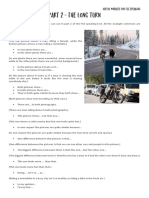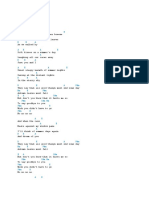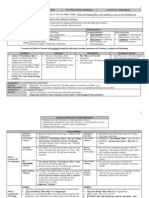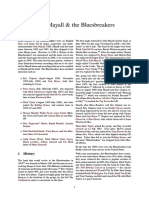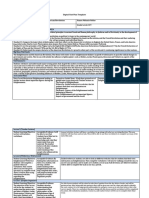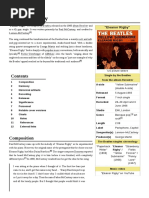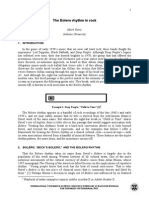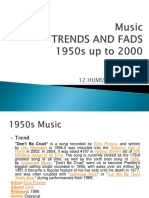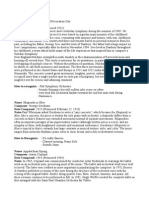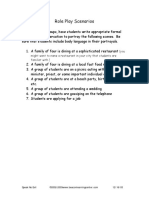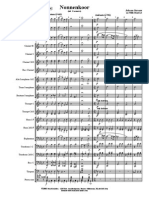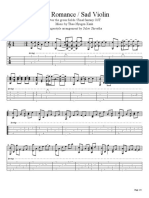Blackbird
Blackbird
Uploaded by
scorbagCopyright:
Available Formats
Blackbird
Blackbird
Uploaded by
scorbagCopyright
Available Formats
Share this document
Did you find this document useful?
Is this content inappropriate?
Copyright:
Available Formats
Blackbird
Blackbird
Uploaded by
scorbagCopyright:
Available Formats
Blackbird
Blackbird singing in the dead of night, take these broken wings and learn to fly. All your life, you were only waiting for the moment to arise. Blackbird singing in the dead of night, take these sunken eyes and learn to see. All your life, you were only waiting for the moment to be free. Black bird fly, black bird fly into the light of the dark black night. Black bird fly, black bird fly into the light of the dark black night. Blackbird singing in the dead of night Take these broken wings and learn to fly. All your life You were only waiting for this moment to arise You were only waiting for this moment to arise You were only waiting for this moment to arise History:
The history of "Blackbird" - essentially a Paul McCartney song, written and performed by him alone - is one of the more nebulous in Beatles lore. Some sources claim the song was written in India, inspired by an actual blackbird singing outside Paul's window; indeed, the song shows up, nearly intact, on the "Kinfauns" demos made at George's Esher home in late May 1968. Paul let this perception stand for years before claiming that the song was composed at his farm in Scotland. When, shortly after returning from Scotland in September 1968, he invited photographer Linda McCartney to his London home for the first time, fans outside his home heard him playing the song to them while sitting in a window.
Folk singer Donovan, who taught John the finger-picking style of guitar that he would later use on "Julia" and "Dear Prudence," among other tracks, was with the band during their spiritual retreat in Rishikesh, India in the spring of 1968, and while he didn't recall the song being played there, it was his guitar style that he claims was an inspiration for "Blackbird." Paul, on the other hand, cites a well-known Bach piece called "Bourree in E minor," written for lute but often played on acoustic guitar, as the main inspiration; the contrapuntal bass-and-melody arrangement was apparently what got the song going. (Further muddying the waters, John claimed to have given Paul "a line" of the song, usually thought to be the very Lennonesque phrase "take these broken wings and learn to fly." McCartney has never acknowledged this.)
Although the song has been often interpreted as a metaphor for race relations and the civil rights struggle then underway by African-Americans in the US, for decades McCartney kept silent on such a reading, perhaps because notorious cult leader Charles Manson read the song as an invitation to an outright race war. However, the "civil rights struggle" interpretation persisted, and Paul eventually began claiming it as truth. (It's worth noting that Paul later
recorded a similar solo song called "Bluebird" which had no such metaphor attached to it.) The recording of "Blackbird" was as simple as possible. Paul entered Studio 2 on June 11, 1968, and ran through the song 32 times to get it just the way he wanted, accompanying himself only on acoustic guitar and his feet tapping for rhythm (recorded by a mic placed near the ground). After a slight bit of vocal double-tracking, the song was complete. During the recorded rehearsal, Paul also made a very bluesy dry run of "Helter Skelter" as well as a short, improvised song called "Gone Tomorrow, Here Today" that was never officially released. Meanwhile in Studio 3, John gave an interview and finished assembling the tape loops that would eventually form the basis of "Revolution 9."
Trivia: Although the rhythmic sound in "Blackbird" is often misattributed to percussion or a metronome, it is indeed Paul's feet - his "White Album girlfriend" Francie Schwartz attests to this, and there's footage of Paul with her in the studio
performing the song just that way. Perhaps adding weight to Donovan's claim, he and Paul ran through "Blackbird" during sessions for Apple protege Mary Hopkin's debut album Post Card in late 1968. McCartney performed "Blackbird" several times during his solo career: first as part of a medley in the one-time-only ATV/ABC special James Paul McCartney, broadcast in 1973, then during his 1974 Nashville sessions, as well as in an unreleased film of Paul's, The Backyard, shot at around the same time. It was part of the set list during his 1974 tour of Australia, his famous "Wings Over America" tour of 1976, his 1991 appearance on the MTV seriesUnplugged, on his 2002 world tour, and was performed during an "Earth Day" concert at the Hollywood Bowl in 1993.
The blackbird sounds that enter during the middle of the song and are heard again at the end were taken from the Abbey Road Studios' vast library of sound effects; they were recorded by studio engineer Stuart Eltham in his back yard in 1965. As with so many Beatles songs from this era, the effects are slightly different in the mono mix, featuring extra bird sounds from the same source mixed in at different parts of the song. Adding to the song's mythology, Paul has also claimed to have woken up one morning after the song was recorded to hear an actual blackbird outside his window, singing a melody very like that of his tune
Themes Found in The Beatles' "Blackbird"
Many people are not aware of the true meaning of Paul McCartney's famous song "Blackbird." This beautiful, melodic tune is actually a moving tribute to the American civil rights movement. Here is a brief rundown of the themes found in The Beatles' "Blackbird."
The blackbird metaphor
The song "Blackbird" begins with the words: "Blackbird singing in the dead of night, take these broken wings and learn to fly." "Blackbird" uses the blackbird as a metaphor for the African-American people living under oppression, discrimination and inequality. The blackbird yearns to fly free and unfettered, and the bird's nighttime anthem is something that is not suppressed by sleep.
Waiting for this moment to arrive
The next lyrics refer to the blackbird's anticipation of the next moment, when emancipation begins. The lyrics are accompanied by an uplifting guitar figure that ascends up an octave. The song is in a major key, which adds to the uplifting feeling.
Blackbird, fly
The refrain "blackbird, fly," obviously brings the listener back to the main theme of emancipation. This refrain is accompanied by a suspended-sounding series of chord changes, outlined by major thirds. It is not clear that the chorus is resolved until the end, when McCartney sings "Into the light of the dark, dark night." McCartney uses the blues scale at the end of the chorus, which has its origin in the popular music of African-Americans. In addition to its renown as one of the most popular songs in the musical lexicon, "Blackbird" is an important civil rights anthem.
http://www.animalmusica.com/themes-found-in-the-beatles-blackbird
You might also like
- Mixed Tense Practice Activities Promoting Classroom Dynamics Group Form - 16470100% (7)Mixed Tense Practice Activities Promoting Classroom Dynamics Group Form - 164702 pages
- Mixed Tense Practice Activities Promoting Classroom Dynamics Group Form - 16470100% (7)Mixed Tense Practice Activities Promoting Classroom Dynamics Group Form - 164702 pages
- Bill Harry - The Paul McCartney Encyclopedia 4No ratings yetBill Harry - The Paul McCartney Encyclopedia 4155 pages
- Huddersfield Jazz Guitar Society: Celebrating The Art and Craft of Jazz GuitarNo ratings yetHuddersfield Jazz Guitar Society: Celebrating The Art and Craft of Jazz Guitar24 pages
- Complete Little Girl Blue The Life of Karen Carpenter 1st Edition Randy L. Schmidt PDF For All Chapters100% (10)Complete Little Girl Blue The Life of Karen Carpenter 1st Edition Randy L. Schmidt PDF For All Chapters70 pages
- Blues: Blues, Secular Folk Music Created by African Americans in The Early 20thNo ratings yetBlues: Blues, Secular Folk Music Created by African Americans in The Early 20th2 pages
- Katsanevakis Anastasia Fleetwood Mac Biography FinalNo ratings yetKatsanevakis Anastasia Fleetwood Mac Biography Final10 pages
- Music Therapy For Children With Autism Spectrum DisordersNo ratings yetMusic Therapy For Children With Autism Spectrum Disorders5 pages
- Donald Trumps Jacksonian and Jeffersonian Foreign PolicyNo ratings yetDonald Trumps Jacksonian and Jeffersonian Foreign Policy21 pages
- House of The Rising Sun - Jackson AndersonNo ratings yetHouse of The Rising Sun - Jackson Anderson3 pages
- One Track Forward, Two Tracks Back - Old Music, New MusickingNo ratings yetOne Track Forward, Two Tracks Back - Old Music, New Musicking4 pages
- Donovan: A Promotional Poster For The Single From The UKNo ratings yetDonovan: A Promotional Poster For The Single From The UK3 pages
- Yeary - The Bolero Rhythm in Rock-Libre PDFNo ratings yetYeary - The Bolero Rhythm in Rock-Libre PDF6 pages
- "Trout Mask Replica" - Captain Beefheart and His Magic Band (1969)No ratings yet"Trout Mask Replica" - Captain Beefheart and His Magic Band (1969)4 pages
- Locomotive Breath: "Locomotive Breath" Is A Song by The British Progressive Rock BandNo ratings yetLocomotive Breath: "Locomotive Breath" Is A Song by The British Progressive Rock Band4 pages
- SONG ANALYSIS SAC - Unit 2 VCE - OC3 - SampleNo ratings yetSONG ANALYSIS SAC - Unit 2 VCE - OC3 - Sample2 pages
- Birdsong and Music Transcript: Date: Friday, 1 July 2011 - 6:00PM Location: Barnard's Inn HallNo ratings yetBirdsong and Music Transcript: Date: Friday, 1 July 2011 - 6:00PM Location: Barnard's Inn Hall6 pages
- The Beatles (Phaidon Music Ebook) - 179 PDFNo ratings yetThe Beatles (Phaidon Music Ebook) - 179 PDF10 pages
- Bill Harry - The Paul McCartney Encyclopedia 16No ratings yetBill Harry - The Paul McCartney Encyclopedia 1615 pages
- Role Play Scenarios: (You Might Want To Name A Restaurant in Your City That Students Are Familiar With.)No ratings yetRole Play Scenarios: (You Might Want To Name A Restaurant in Your City That Students Are Familiar With.)4 pages
- Present Perfect Put The Verbs Into The Correct FormNo ratings yetPresent Perfect Put The Verbs Into The Correct Form1 page
- (English - Test) : A. Write The Participle Forms of The Following VerbsNo ratings yet(English - Test) : A. Write The Participle Forms of The Following Verbs1 page
- Rewrite These Sentences. Use The Words in Brackets Without Changing Them100% (1)Rewrite These Sentences. Use The Words in Brackets Without Changing Them1 page
- Teaching Kids Activities Working With Biographies Reading TextNo ratings yetTeaching Kids Activities Working With Biographies Reading Text1 page
- Hotel Role-Play Prompts: TH ND RD TH ST RDNo ratings yetHotel Role-Play Prompts: TH ND RD TH ST RD2 pages
- Mixed Up Conversation at The Front Desk of A Hotel0% (1)Mixed Up Conversation at The Front Desk of A Hotel4 pages
- 2014 Fall Band Concert Program With MedalistNo ratings yet2014 Fall Band Concert Program With Medalist9 pages
- Life's Incredible Again: Michael Giaccinno Arr. Archie KeltzNo ratings yetLife's Incredible Again: Michael Giaccinno Arr. Archie Keltz17 pages
- Sonata For Alto Saxophone and Piano by William Albright0% (3)Sonata For Alto Saxophone and Piano by William Albright8 pages
- Harmonic Wheel - Applications of Improchart - Examples Improvisation100% (2)Harmonic Wheel - Applications of Improchart - Examples Improvisation39 pages
- Analysis and Interpretation in The Performance of Handels Concerti Grossi, Op.6No ratings yetAnalysis and Interpretation in The Performance of Handels Concerti Grossi, Op.65 pages
- Dancing in The Dark - FULL Big Band - May - Frank Sinatra PDF67% (3)Dancing in The Dark - FULL Big Band - May - Frank Sinatra PDF59 pages
- Jazz From Its Origins To The Present Senior Scholars Fall 2017 WednesdaysNo ratings yetJazz From Its Origins To The Present Senior Scholars Fall 2017 Wednesdays6 pages
- Jazz Standards You Should Learn - Free Jazz Lessons100% (1)Jazz Standards You Should Learn - Free Jazz Lessons10 pages
- In A Sentimental Mood - Wikipedia, The Free EncyclopediaNo ratings yetIn A Sentimental Mood - Wikipedia, The Free Encyclopedia3 pages











